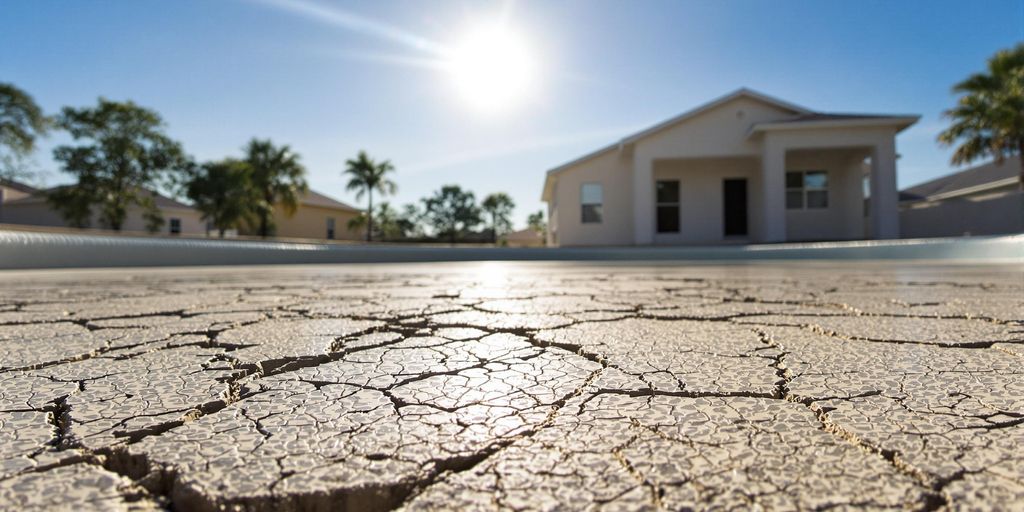Florida’s once-booming housing market is experiencing a significant cool-down, marked by dropping prices and a surge in available homes. This shift is empowering buyers after years of intense competition and escalating costs, signaling a potential market correction rather than a crash.
Florida’s Housing Market Shifts: A Buyer’s Resurgence
Florida’s housing market, a national hotspot for several years, is now undergoing a notable transformation. After a period of unprecedented price growth and limited inventory, the pendulum is swinging back, favoring buyers. This change is characterized by a significant increase in active listings and a corresponding decrease in home prices across many of the state’s major metropolitan areas.
Key Takeaways
- Increased Inventory: Active listings have surged, with some areas seeing inventory quadruple since 2022. This is not due to a sudden influx of new constructions, but rather a slowdown in sales, causing homes to sit longer on the market.
- Price Reductions: Florida dominates the national landscape for price reductions, with cities like North Port, Tampa, Cape Coral, and Jacksonville experiencing significant percentages of homes with slashed asking prices.
- Affordability Crisis: Years of rapid price appreciation have led to a severe affordability crisis, pricing out many local residents and deterring new buyers. This demand destruction is a primary driver of the current market correction.
- Rising Costs: Homeowners are grappling with escalating costs, including homeowner association fees and property insurance rates, prompting some to sell.
- Market Correction, Not Crash: Experts largely agree that the current situation is a market correction, not a repeat of the 2008 housing bubble, as there is less excessive leverage in the market.
The Impact of Soaring Inventory
The inventory of homes for sale in Florida has reached multi-year highs. For instance, active listings in the Miami-Fort Lauderdale-West Palm Beach metro jumped by 39% year-over-year in May, reaching over 51,901 homes. Other major metros show even more dramatic increases compared to pre-pandemic levels:
- Tampa-St. Petersburg-Clearwater: +40% compared to May 2019
- Orlando-Kissimmee-Sanford: +42% compared to May 2019
- Cape Coral-Fort Myers: +36% compared to May 2019
- North Port-Sarasota-Bradenton: +36% compared to May 2019
- Jacksonville: +25% compared to May 2019
- Lakeland-Winter Haven: +80% compared to May 2019
This surge in unsold homes is a direct result of withered demand, as sales have plunged. Homes are lingering on the market for extended periods, forcing sellers to adjust their expectations.
Price Adjustments and Seller Challenges
Florida cities are at the forefront of price reductions nationwide. In April, North Port saw nearly 30% of its listed homes undergo price decreases. Tampa (29.3%), Cape Coral (28.2%), and Jacksonville (27.6%) followed closely. This trend indicates a significant shift in power from sellers to buyers, who are now in a stronger negotiating position. Sellers are increasingly compelled to lower asking prices or invest in costly improvements, such as new roofs, to attract buyers and mitigate high insurance costs.
Factors Driving the Downturn
Several factors contribute to Florida’s cooling market:
- Unaffordable Prices: The rapid escalation of home prices during the pandemic era created an unsustainable market where many potential buyers, particularly local residents, could no longer afford to purchase homes.
- Higher Interest Rates: Increased mortgage rates have further reduced buyer purchasing power and dampened demand.
- Rising Insurance Premiums: Soaring property insurance costs in Florida add a significant burden to homeownership, deterring buyers and prompting some current owners to sell.
- Reduced In-Migration: The surge of new residents moving to Florida during the pandemic has tapered off, further reducing demand.
- Condominium Law Fallout: New building safety legislation, enacted after the Surfside condo collapse, requires structural inspections and fully funded reserves for older condo buildings. This has led to massive assessments for many condo owners, pushing some to sell at a discount and scaring off potential buyers.
Looking Ahead
While the market is undoubtedly slowing, experts generally view this as a necessary correction to restore balance and affordability. The absence of excessive leverage, unlike the 2008 crisis, suggests a more controlled adjustment. However, the duration of this downturn remains uncertain, dependent on national economic trends, interest rate policies, and consumer confidence.
Sources
- Housing market hitting the brakes? New analysis finds Florida dominates areas slashing home prices, Florida Politics.
- Inventory of Homes for Sale in the Biggest Florida Metros Piles Up to Highest in Years as Demand Has Withered
| Wolf Street, Wolf Street. - South Florida Homes for Sale Quadruple As Residents Leave En Masse, Newsweek.
- Florida’s Suncoast sees steep drop in housing market values, Miami Herald.
- Florida’s housing market cools, forcing sellers to adjust, Gulf Coast News and Weather – Southwest Florida News.


